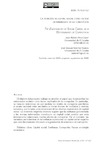La dotación de capital social como factor determinante de la corrupción

Use this link to cite
http://hdl.handle.net/2183/19853Collections
- Investigación (FEE) [923]
Metadata
Show full item recordTitle
La dotación de capital social como factor determinante de la corrupciónAlternative Title(s)
The Endowment of Social Capital as a Determinant of CorruptionDate
2009Citation
Pena López, A. and Sánchez Santos, J. (2009). La dotación de capital social como factor determinante de la corrupción. Revista de Economía Mundial, 22, pp.197-220.
Abstract
[Resumen:] El objetivo del presente trabajo es abordar el papel que desempeñan los
entramados sociales como factor explicativo de la corrupción. En particular, se trata de determinar en qué medida los niveles de corrupción percibidos a escala nacional están asociados a ciertas formas de confianza y normas sociales y, por lo tanto, a las dotaciones de las diversas expresiones de capital social. La evidencia empírica obtenida sugiere que la confianza generalizada y las normas universalitas constituyen un capital social positivo que está inversamente relacionado con los niveles de corrupción. Por el contrario, las
variantes particularistas de la confianza representan un capital social negativo que está directamente vinculado a la generación de relaciones de corrupción. [Abstract:] The objective of the present work is to address the role played by social
capital as an explanatory factor of corruption. In particular, we attempt to estimate to what extent the perceived levels of corruption are associated to certain forms of trust and social norms and, therefore, to social capital in its diverse expressions. The empirical evidence suggests that generalized trust and universalistic norms constitute a positive form of social capital that is inversely related to corruption. By contrast, the particularistic expressions of trust represent a negative social capital directly linked to the rising of corruption relationships.
Keywords
Capital social
Confianza
Corrupción
Nueva sociología económica
Social capital
Trust
Social norms
Corruption
New economic sociology
Confianza
Corrupción
Nueva sociología económica
Social capital
Trust
Social norms
Corruption
New economic sociology
Editor version
Rights
Atribución 3.0 España
ISSN
1576-0162






